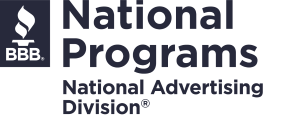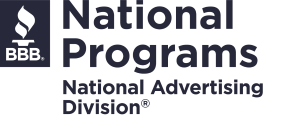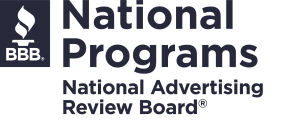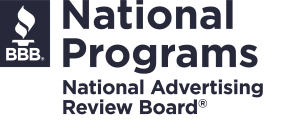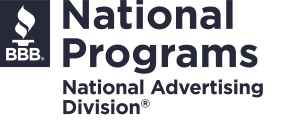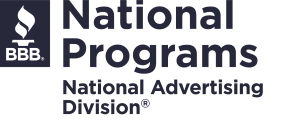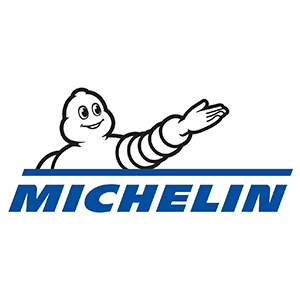
- Chicago’s Smyth earns three MICHELIN Stars
- New York restaurants odo and Sushi Noz each receive two Stars
- Inspectors award new Green Stars in New York and Chicago
- 12 restaurants earn MICHELIN Stars for the first time
NEW YORK, Nov. 7, 2023 — The first MICHELIN Guide Ceremony bringing together New York, Chicago and Washington, D.C., definitely packed a punch, with a new three- MICHELIN-Starred restaurant and two new two-Stars.
Chicago’s Smyth was awarded its third MICHELIN Star, and New York restaurants odo and Sushi Noz each took home two Stars. Chicago’s Daisies received a MICHELIN Green Star, as did Dirt Candy and Family Meal at Blue Hill in New York.
“The famously anonymous MICHELIN Guide inspectors delivered huge news to punctuate a one-night-only celebration for these three culinary communities – buzzing with excitement and emotion, support and encouragement,” said Gwendal Poullennec, the International Director of the MICHELIN Guides. “These milestone announcements solidify these cities as some of the best places in the world to visit for culinary adventures.”
Chicago
- Smyth steals the show, but Daisies commands spotlight with Green Star
- Inspectors name two new MICHELIN-Starred eateries in the Windy City
- Selection comprises 154 restaurants and 38 types of cuisine
“The inspectors have been carefully monitoring the progress at Smyth, especially since it earned two MICHELIN Stars in 2017,” Poullennec said. “They unanimously decided that now is the time to reward the restaurant, Chefs John Shields and Karen Urie Shields, and their staff for delivering peak creativity, precision and teamwork. This is an elite restaurant.”
Here are the new MICHELIN-Starred restaurants, with inspector notes from each (inspectors’ comments in full on the MICHELIN Guide website and mobile app):
Three MICHELIN Stars
Smyth (West Loop; contemporary/creative cuisine)
The very chic Smyth, with its lounge styling and open kitchen, is helmed by Chefs John Shields and Karen Urie Shields. Their cooking is bold and often pushes boundaries, all the while impressing. Sheer creativity is applied to seasonal produce, some of which comes from their garden. A quail egg, gently smoked and topped with caviar, is given a twist with barley caramel. Resting inside its shell, plump Maine uni, amplified with a divine peach gel and wasabi cream, is both stunning and memorable. The chefs’ creativity is on full display in an utterly unique Dungeness crab dish, while wagyu sided by a truffle-flavored doughnut with marrow glaze is yet another hit.
One MICHELIN Star
Atelier (Lincoln Square; American cuisine)
In full view of the dining room, Chef Christian Hunter and his team chart new waters, ever determined to make their own mark on this intimate space. Working quietly and seamlessly, the kitchen delivers a carefully calibrated tasting menu supported by nearby farms and packed with flavor and originality. Familiar dishes like marinated beets, pimento cheese and Caesar salad arrive remodeled and refined, astutely seasoned, and never a leaf or morsel out of place. Hope that the warm clam chowder with lamb bacon and chive oil is still available. It’s a total showstopper.
Indienne (River North; Indian cuisine)
In a city where kitchens break molds and defy expectations, Chef Sujan Sarkar makes a splash of his own on this quiet strip of River North. À la carte is available, but first timers should start with the tasting menu, where Sarkar delivers an original, modern vision of Indian cuisine. His food may look like pieces of art but taste like familiar favorites pulled from across his vibrant homeland. At times showcasing a hint of French sensibility, pani puris, chats and curries arrive deftly spiced and elegantly presented. The kitchen is quick, and the overall effect is impressive refinement.
MICHELIN Green Star
Daisies (Logan Square; Italian cuisine)
Chef/owner Joe Frillman’s menu focuses on produce, and much of that produce comes from his brother’s 30-acre farm, 70 miles outside the city. The restaurant has a fermentation program to preserve produce and limit waste, as well as a compost program to fertilize the farm’s soil and feed its chickens. Its goal is to source local, sustainable food whenever possible and to minimize its footprint by finding uses for commonly discarded items.
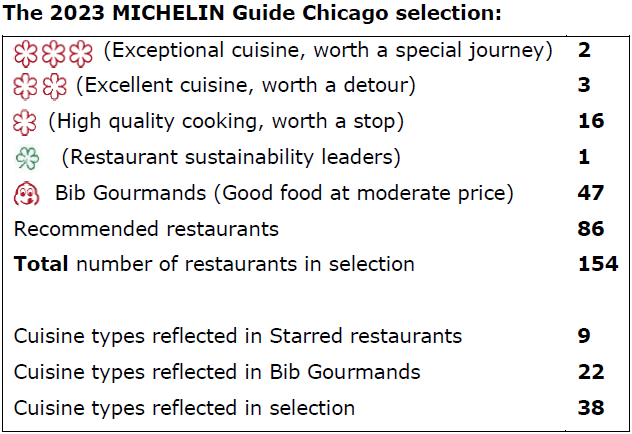
Special Awards – Chicago
In addition to the new Bib Gourmand restaurants and Stars, the Guide announced four special awards:

New York
- 8 New York eateries receive MICHELIN Star awards for first time
- Dirt Candy and Family Meal at Blue Hill earn MICHELIN Green Stars
- Selection comprises 421 restaurants and 62 types of cuisine
“The rise of odo and Sushi Noz has been swift and stunning,” Poullennec said. “These restaurants boast exquisite ingredients and intricate preparation, capped off with the meticulous presentation and attentive service.”
Two MICHELIN Stars
odo (Flatiron; Japanese cuisine)
A serene atmosphere awaits in-the-know diners at this secluded counter, closed off from the cocktail bar in front to foster a mood of intimacy. The service, like the ambience, is warm but unobtrusive, allowing focus to fall on the singular kaiseki menu on offer. Under the assured hand of namesake Chef Hiroki Odo, the cuisine skillfully blends tradition and creative personal touches for a meal that is anything but stuffy.
Flavors are both vibrant and precise, with a depth and purity that attests to superbly sourced ingredients and careful preparation. From a savory broth with impeccably cooked tilefish, lifted with locally grown yuzu, to springy house-made soba noodles with indulgently rich salmon roe, this is cooking that will linger in the memory.
Sushi Noz (Upper East Side; Japanese/sushi cuisine)
There is a certain energy that courses through this sacred space, where every detail recreates an intimate Japanese refuge. Some of the tools alone are marvels, and Chef Nozomu Abe is a meticulous and engaging craftsman. When booking, keep an eye out for his dates and time slots. Commence with cooked dishes like pearly sea perch with fresh ponzu dipping sauce and slender pieces of meltingly tender ice fish. Miso soup is the perfect backdrop for silky-soft eel “noodles” with salted egg yolk and crispy tofu pieces, while sushi is jewel-like. True to Japanese hospitality, kimono-dressed staff and the chef himself see guests off with a spirit of gratitude.
One MICHELIN Star
bōm (Flatiron; Korean cuisine)
bōm, a spacious and modern marble counter tucked behind sister restaurant Oiji Mi, showcases contemporary Korean fare. Chef Brian Kim and team have it down to every last detail, with elegant service and well-executed dishes. Of course, there is premium beef ranging from tenderloin and Wagyu short rib to dry-aged ribeye, but there is so much more than just meat here. The dishes display a tight narration, and the presentations are stunning.
Essential by Christophe (Upper West Side; French Contemporary cuisine)
Chef Christophe Bellanca’s dishes echo a simple elegance, evidenced by plump white asparagus on a fragrant bergamot-flavored crème with a refreshing herb vinaigrette and paper-thin slices of watermelon radish. French technique is married with Asian flavors in a dish of three blue prawns with genmaicha tuille, and braised black sea bass with shiitake chutney, razor clams and a turmeric emulsion is memorable.
Jōji (Midtown East; Japanese/Sushi cuisine)
Three chefs — Xiao Lin, Wayne Cheng and George Ruan — who cut their teeth at Masa now shine in this ritzy location at the base of the gleaming and impressive One Vanderbilt. Jōji has big expectations (and commensurate pricing), but this omakase spot, where tradition reigns but never feels stuffy, rises to the challenge. From the selection of fish (largely sourced from Toyosu Market) to the variety of dishes, a meal here hits all the right notes.
Meju (Queens-Long Island City; Korean cuisine)
This chef’s counter is as much a classroom as it is a restaurant. Chef Hooni Kim is a worthy guide as he builds a deeply personal menu around traditional Korean ingredients that he’s been wild fermenting and aging for the last decade. Dazzling versions of doenjang, gochujang, ganjang and ssamjang shine with silky tofu, fried pancakes, Miyazaki beef and Niman Ranch pork. He brings the room together and impresses with carefully calibrated dishes that appear strikingly minimalist.
Restaurant Yuu (Brooklyn-Williamsburg; French Contemporary cuisine)
Restaurant Yuu pours on the drama, albeit in a supremely elegant way. Chef Yuu Shimano creates dishes that are classically French, but seen through the eyes of Japanese omotenashi. Diners are treated to around 20 courses that could include decadent bites like toasted brioche, made in house by pastry chef Masaki Takahashi, topped with foie gras and a delicate cut of binchotan-seared wagyu.
Shmoné (West Village; Israeli cuisine)
Many kitchens boast about using fresh ingredients, but Shmoné takes that philosophy to another level, creating a new menu daily (though some items stick around). Chef Eyal Shani’s cooking relies on the grill all the way through to dessert, where grilled figs atop Chantilly cream have made an appearance. The flavors are impressively dialed-in and make for a focused meal that is surprisingly approachable and humble.
Sushi Ichimura (Tribeca; Japanese/sushi cuisine)
Among real sushi enthusiasts, Chef Eiji Ichimura is a household name. His career in the city spans two decades, and his commitment to edomae-style omakase has shaped this city’s sushi sensibility. He now finds himself in Tribeca behind a 10-seat counter made from gorgeous cedar wood. He works meticulously and at his own pace, slicing fish flown in from Japan three times a week.
Torrisi (SoHo/Nolita; Italian-American/Contemporary cuisine)
Nestled inside the landmark Puck Building, this highly imaginative restaurant expertly balances the creative and the familiar. Chefs Rich Torrisi, Mario Carbone and Charlie England and team cater to excited diners, who feast on items like the escarole and endive salad and chicken stracciatella soup with textbook chicken broth, fluffy egg and savory meatballs. It’s the boule, baked, finished on the grill and filled with dreamy clams, that’s pure aromatic bliss.
MICHELIN Green Star
Dirt Candy (Lower East Side; vegetarian cuisine)
Chef Amanda Cohen aims for a meat-free supply chain, seeking to help change the way diners think about vegetables. The restaurant focuses on hyper-local products to make a global impact, including ordering seasonal produce and dairy products from nearby farms. The kitchen uses electric, and the staff reduces and repurposes food waste whenever possible. The restaurant’s wine list is a tribute to women winemakers producing biodynamic wines. Dirt Candy also emphasizes support for its employees by eliminating tipping, offering a health plan and subsidizing educational opportunities.
Family Meal at Blue Hill (Greenwich Village; contemporary cuisine)
Vegetables are a primary ingredient in the menu offered by Chef Mark Ordaz, and they are paired with grains, legumes and dairy, while meat and fish play a supporting role. Chef maintains relationships with several farmers, which allows them to find out promising products that often go overlooked. The restaurant also has an organic rooftop garden. Sustainability education of the staff is also a key component for the restaurant, which also has a composting program, sustainably sourced walnut tables and LED lighting.
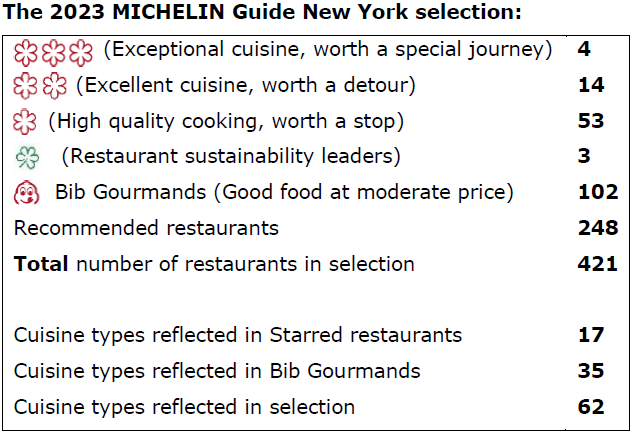
Special Awards – New York
In addition to the new Bib Gourmand restaurants and Stars, the Guide announced five special awards:
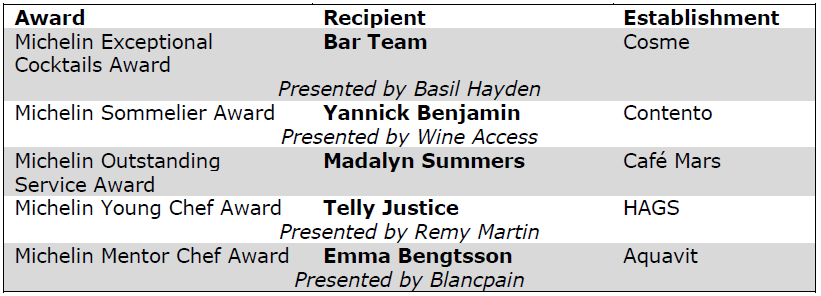
Washington, D.C.
- 25 restaurants receive MICHELIN Stars, including two new 1-Stars
- Selection comprises 122 restaurants and 37 types of cuisine
“The MICHELIN Guide inspection team is delighted add the international flavors of Causa and Rania to the Washington selection of Starred establishments,” Poullennec said. “These world-class restaurants blend tradition with innovation to deliver a delicious meal and memorable experience.”
One MICHELIN Star
Causa (Blagden Alley; Peruvian cuisine)
Chef Carlos Delgado delivers a taste of his birthplace in a dual-concept space in Blagden Alley. Nestled on the first floor, Causa seats around 20 for a tasting menu that takes diners on a journey of flavors inspired by the topography of Peru. It all begins in Lima with coastal seafood, then progresses into the Andes and the Amazon.
Rania (Penn Quarter; Indian cuisine)
This fine dining concept seems fit for a queen, and good thing too, since Rania translates to “queen” in Hindi and Sanskrit. Chef Chetan Shetty delivers something entirely enticing here with his inventive menu. There are plenty of contemporary touches along with a few surprises (think braised pork belly vindaloo).
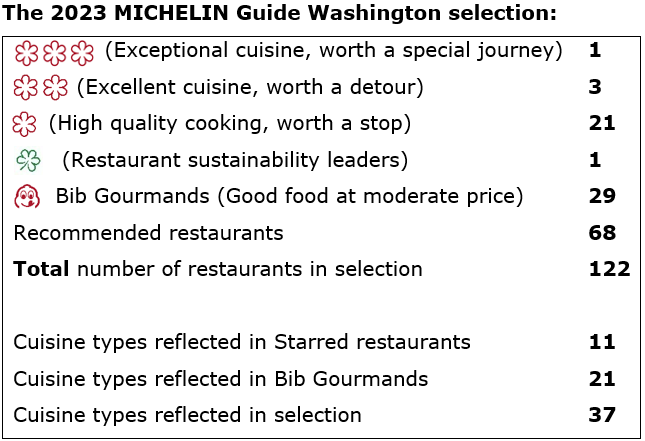
Special Awards – Washington, D.C.
In addition to the new Bib Gourmand restaurants and Stars, the Guide announced four special awards:

The MICHELIN Guide Ceremony is presented with the support of Capital One.
Hotels
The restaurants join the MICHELIN Guide selection of hotels, which features the most unique and exciting places to stay in New York, Washington, Chicago, and throughout the world.
Each hotel in the selection has been chosen by MICHELIN Guide experts for its extraordinary style, service, and personality — with options for all budgets — and each can be booked directly through the MICHELIN Guide website and app. Standouts from the selection include the rejuvenated Hotel Chelsea in New York, the character-filled Riggs in Washington, and the iconic Soho House in Chicago.
The MICHELIN Guide is a benchmark in gastronomy. Now it’s setting a new standard for hotels. Visit the MICHELIN Guide website, or download the free app for iOS and Android, to discover every restaurant in the selection and book an unforgettable hotel.

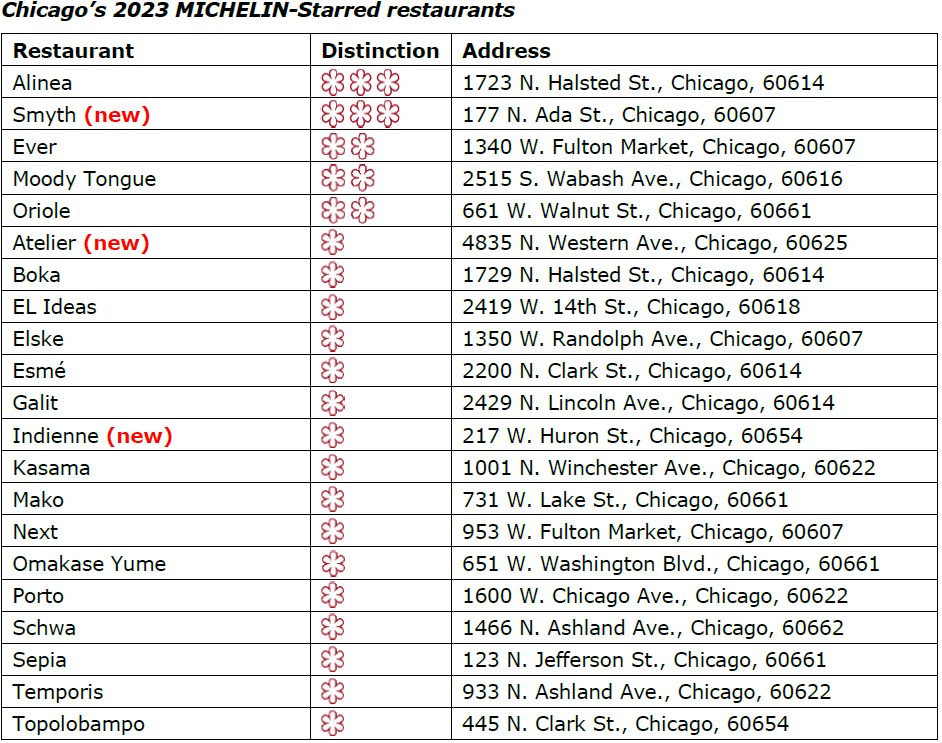

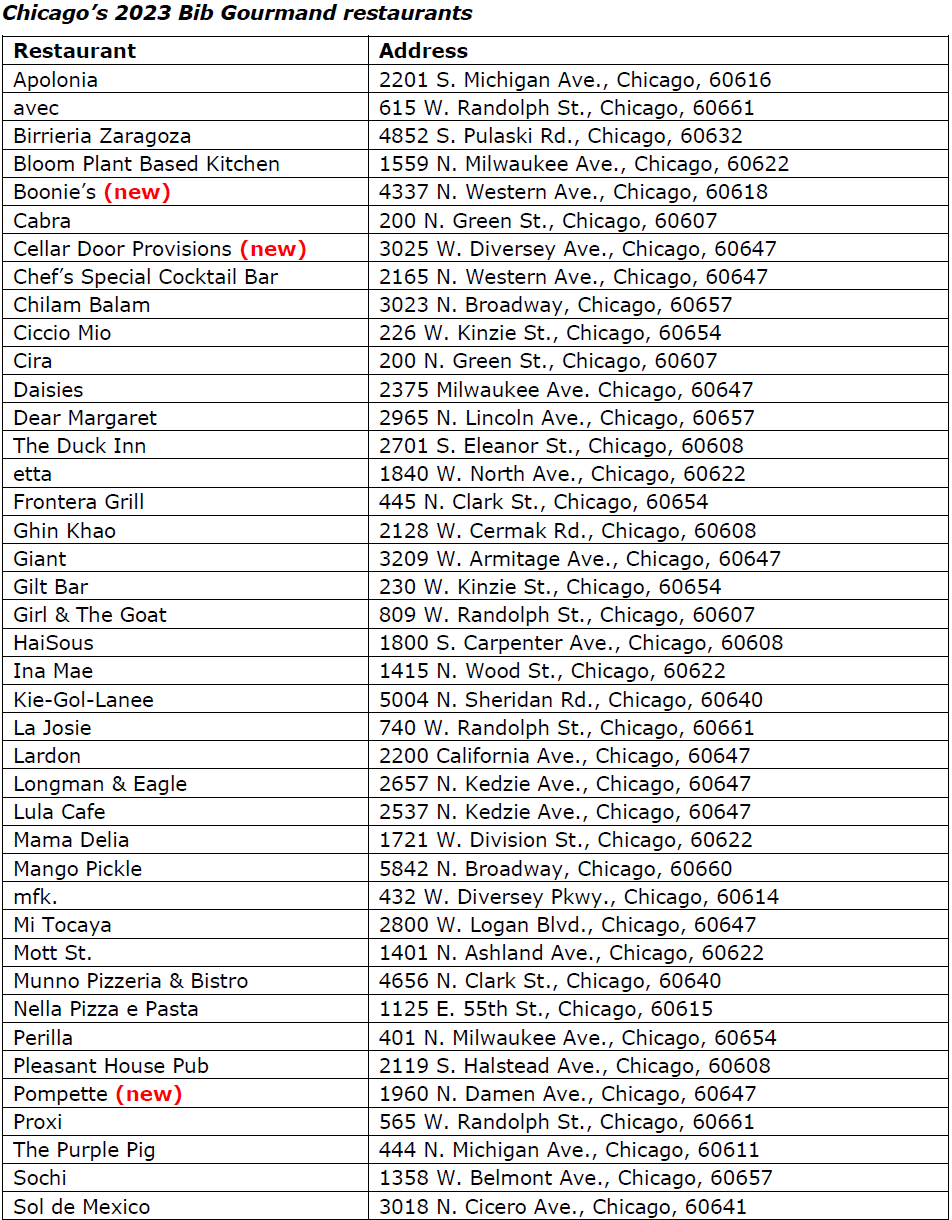

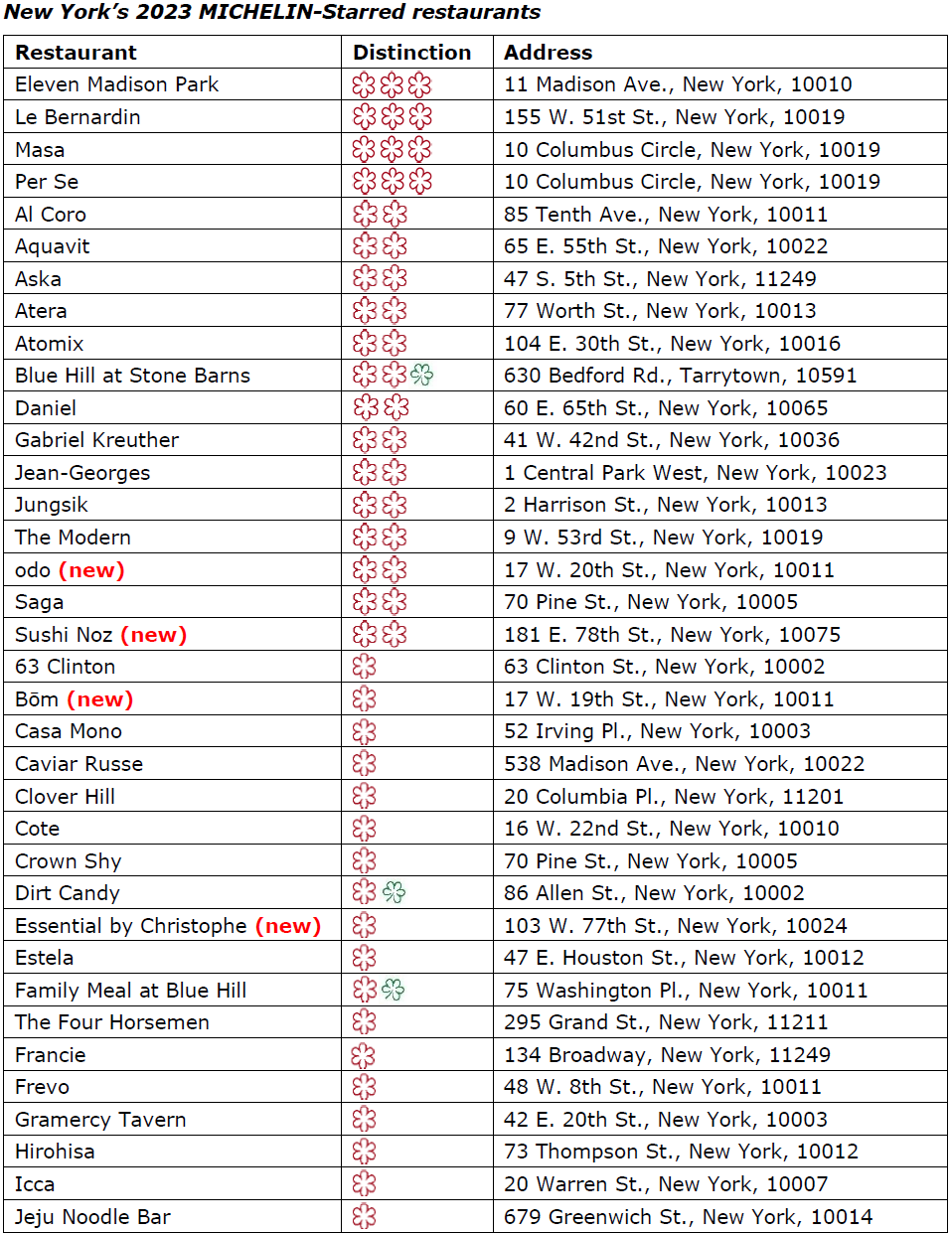
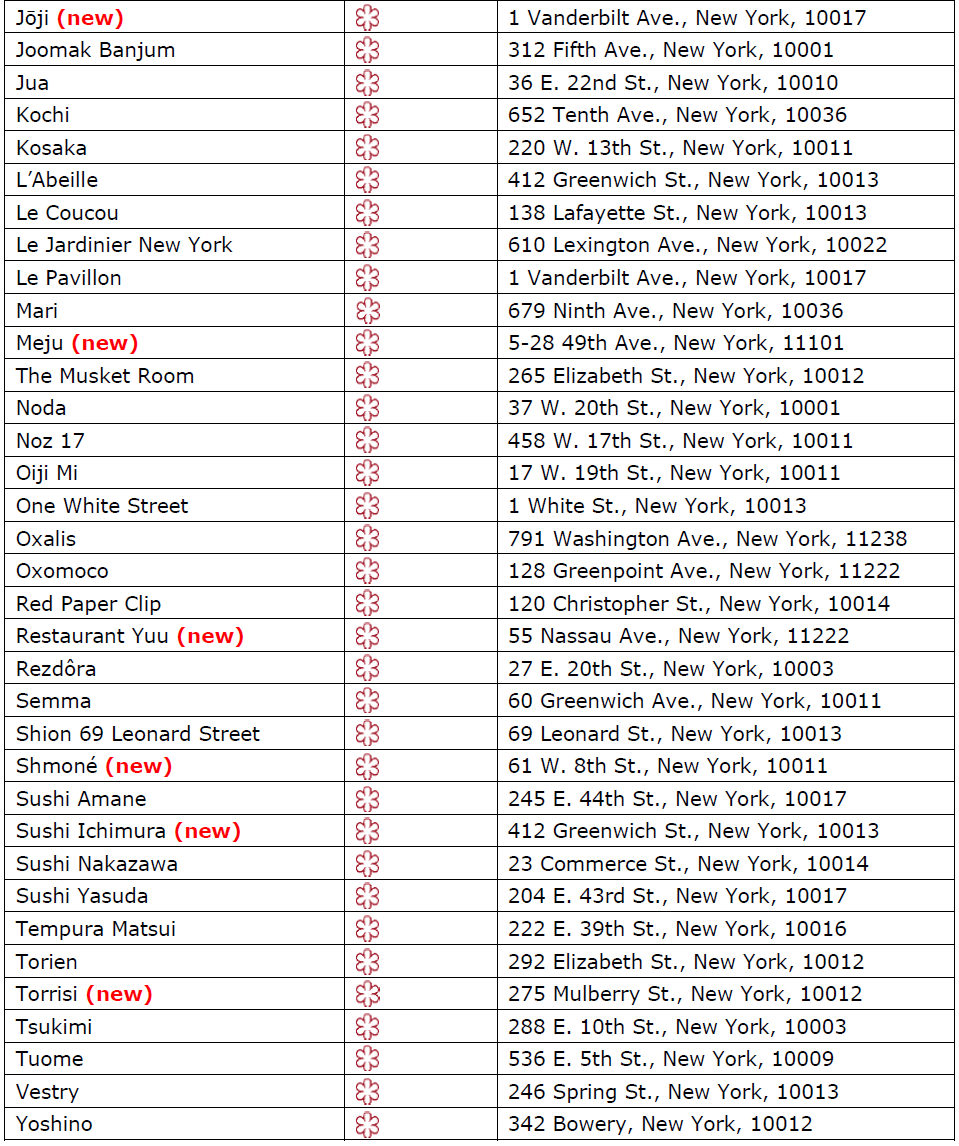

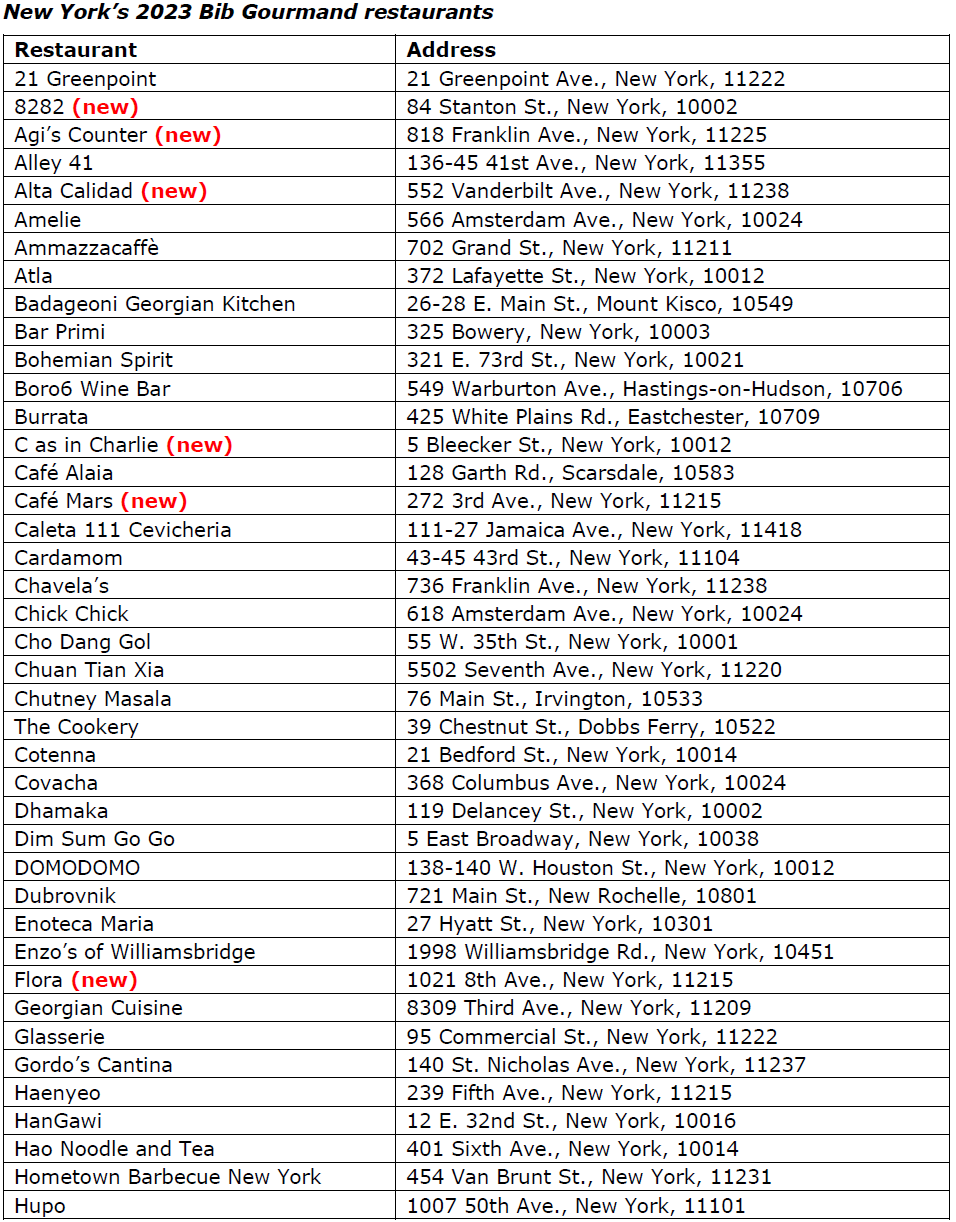
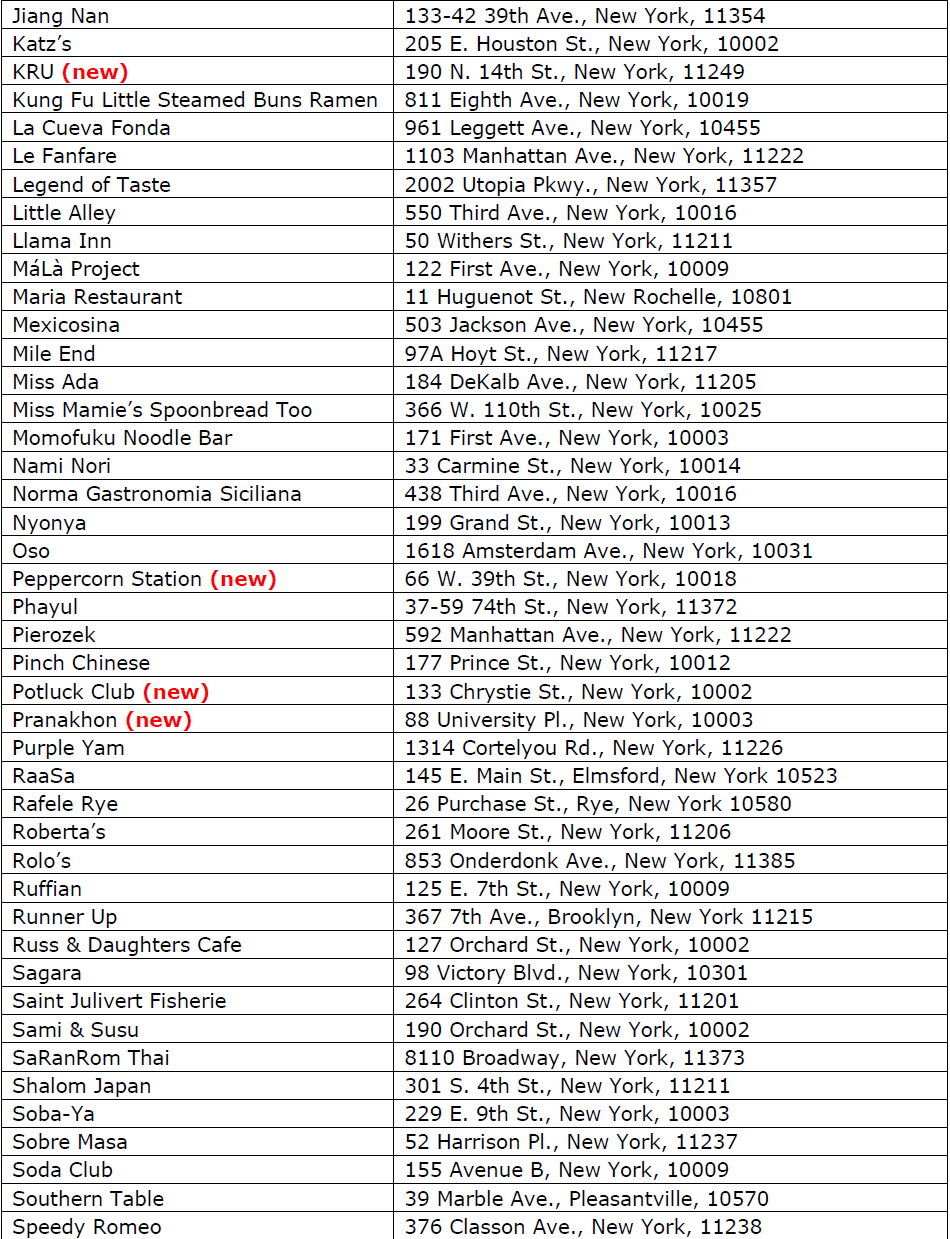
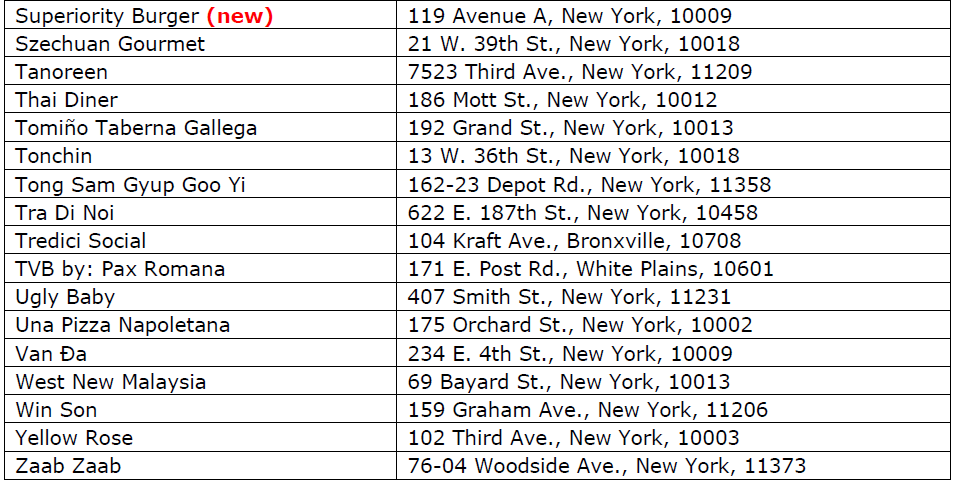
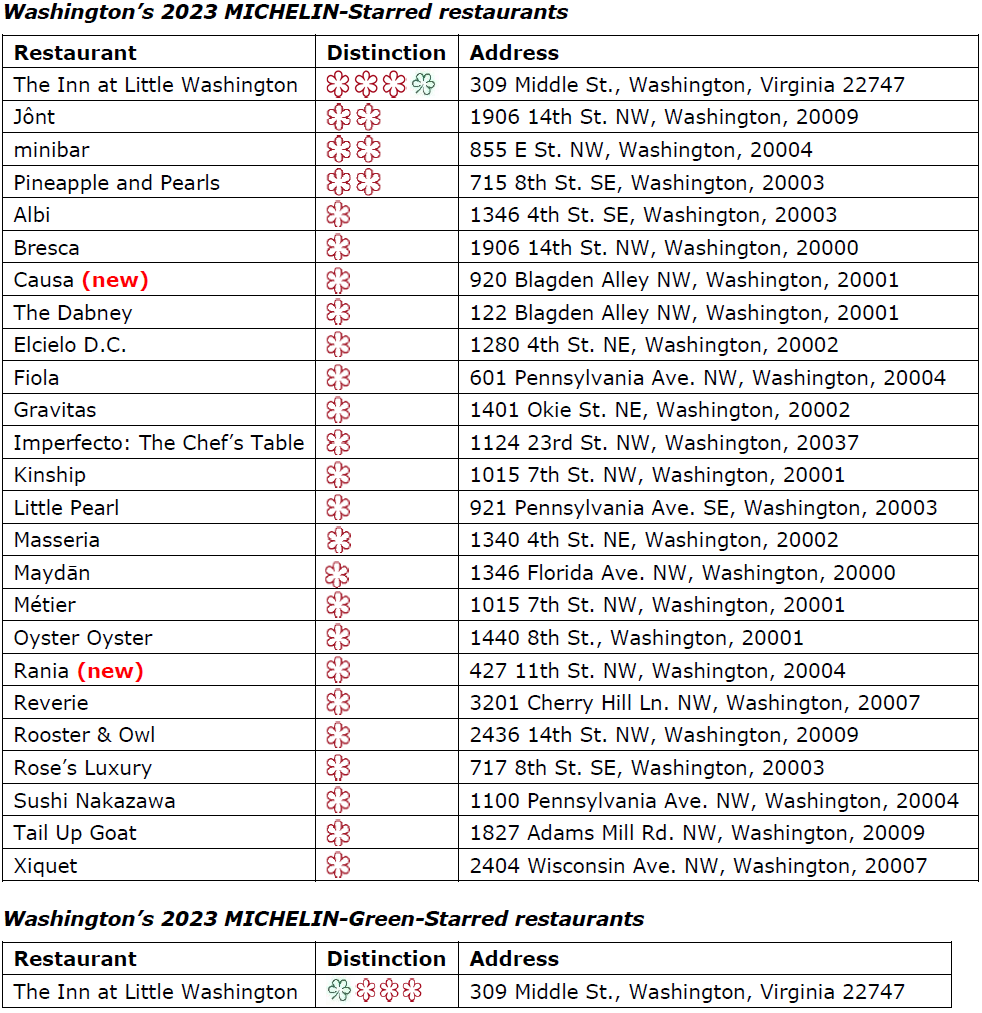
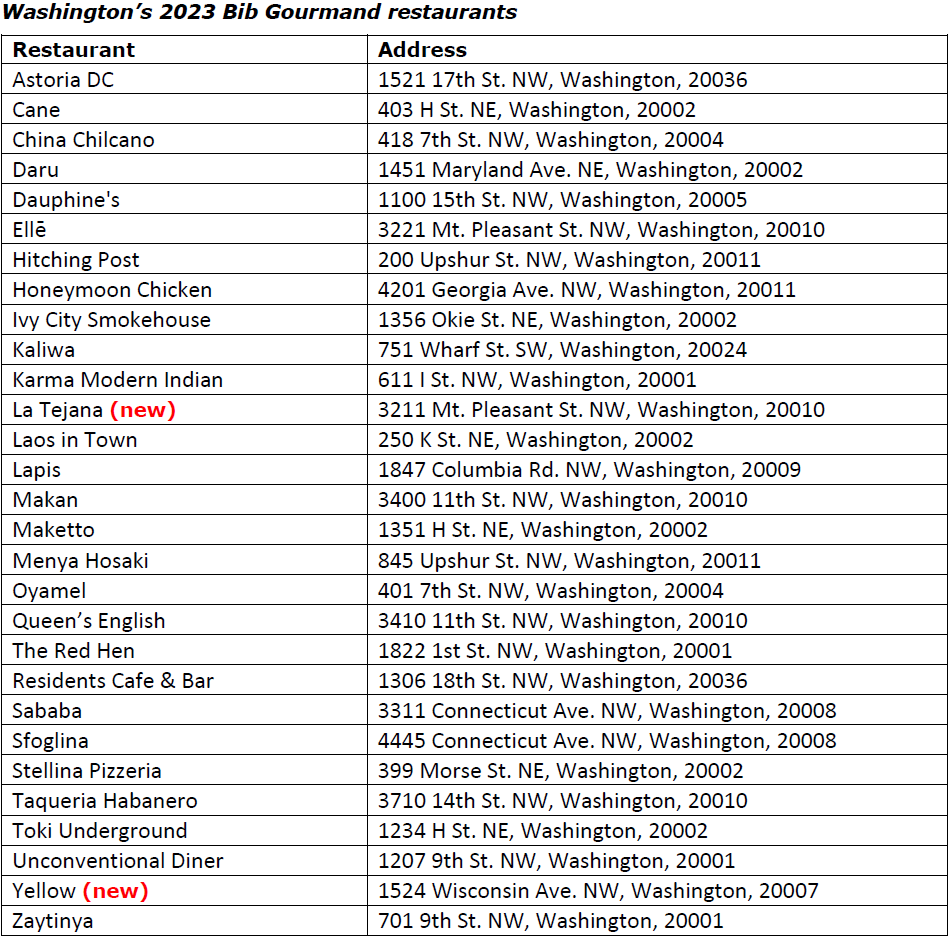
About Michelin North America, Inc.
Michelin, the leading mobility company, is working with tires, around tires and beyond tires to enable Motion for Life. Dedicated to enhancing its clients’ mobility and sustainability, Michelin designs and distributes the most suitable tires, services and solutions for its customers’ needs. Michelin provides digital services, maps and guides to help enrich travel and make them unique experiences. Bringing its expertise to new markets, the company is investing in high-technology materials, 3D printing and hydrogen, to serve a wide variety of industries — from aerospace to biotech. Headquartered in Greenville, South Carolina, Michelin North America has approximately 23,000 employees and operates 34 production facilities in the United States and Canada. (michelinman.com)
About Capital One
At Capital One we’re on a mission for our customers – bringing them best-in-class products, rewards, service, and experiences. Capital One is a diversified bank that offers products and services to individuals, small businesses and commercial clients. We use technology, innovation, and interaction to provide consumers with products and services to meet their needs. Through Capital One Dining and Capital One Entertainment, we provide our rewards cardholders with access to unforgettable experiences in the areas they’re passionate about, including dining, music and sports. Learn more at capitalone.com/dining and capitalone.com/entertainment.
For more information, contact:
Andrew Festa
Michelin North America
andrew.festa@michelin.com
Devon Gunn
Capital One
devon.gunn@capitalone.com
Phone: 571-308-4762


